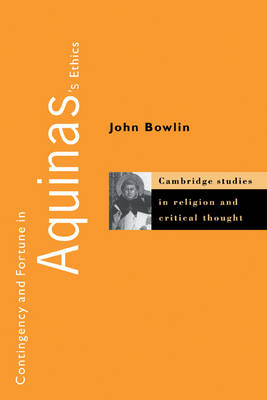
Contingency and Fortune in Aquinas's Ethics
Seiten
2010
Cambridge University Press (Verlag)
978-0-521-15342-3 (ISBN)
Cambridge University Press (Verlag)
978-0-521-15342-3 (ISBN)
Bowlin argues that Aquinas's account of the moral life can be understood only when attention is focused on his remarks about the effects of contingency and fortune upon virtue, agency and happiness. This study places Aquinas more precisely in the history of ethics, among Aristotle, Augustine, and the Stoics.
In this study John Bowlin argues that Aquinas's moral theology receives much of its character and content from an assumption about our common lot: the good we desire is difficult to know and to will, in particular because of contingencies of various kinds - within ourselves, in the ends and objects we pursue, and in the circumstances of choice. Since contingencies are fortune's effects, Aquinas insists that it is fortune that makes good choice difficult. Bowlin then explicates Aquinas's treatment of a number of topics in light of this difficulty: the moral and theological virtues, the first precepts of the natural law, the voluntariness of virtuous action, and the happiness available to us in this life. By noting that Aquinas proceeds with an eye on fortune's threats to virtue, agency, and happiness, Bowlin places him more precisely in the history of ethics, among Aristotle, Augustine, and the Stoics.
In this study John Bowlin argues that Aquinas's moral theology receives much of its character and content from an assumption about our common lot: the good we desire is difficult to know and to will, in particular because of contingencies of various kinds - within ourselves, in the ends and objects we pursue, and in the circumstances of choice. Since contingencies are fortune's effects, Aquinas insists that it is fortune that makes good choice difficult. Bowlin then explicates Aquinas's treatment of a number of topics in light of this difficulty: the moral and theological virtues, the first precepts of the natural law, the voluntariness of virtuous action, and the happiness available to us in this life. By noting that Aquinas proceeds with an eye on fortune's threats to virtue, agency, and happiness, Bowlin places him more precisely in the history of ethics, among Aristotle, Augustine, and the Stoics.
Preface; List of abbreviations; Introduction; 1. Virtue and difficulty; 2. The contingency of the human good; 3. Natural law and the limits of contingency; 4. Virtue and discontent; 5. Virtue and fortune; Epilogue: hope and happiness; References; Index.
| Erscheint lt. Verlag | 10.6.2010 |
|---|---|
| Reihe/Serie | Cambridge Studies in Religion and Critical Thought |
| Zusatzinfo | Worked examples or Exercises |
| Verlagsort | Cambridge |
| Sprache | englisch |
| Maße | 152 x 230 mm |
| Gewicht | 400 g |
| Themenwelt | Geisteswissenschaften ► Philosophie ► Ethik |
| Geisteswissenschaften ► Philosophie ► Philosophie des Mittelalters | |
| Religion / Theologie ► Christentum ► Kirchengeschichte | |
| ISBN-10 | 0-521-15342-5 / 0521153425 |
| ISBN-13 | 978-0-521-15342-3 / 9780521153423 |
| Zustand | Neuware |
| Haben Sie eine Frage zum Produkt? |
Mehr entdecken
aus dem Bereich
aus dem Bereich
von Athanasius bis Gregor dem Großen
Buch | Softcover (2024)
C.H.Beck (Verlag)
CHF 18,90
eine Geschichte der christlichen Kunst
Buch | Hardcover (2024)
C.H.Beck (Verlag)
CHF 44,75


